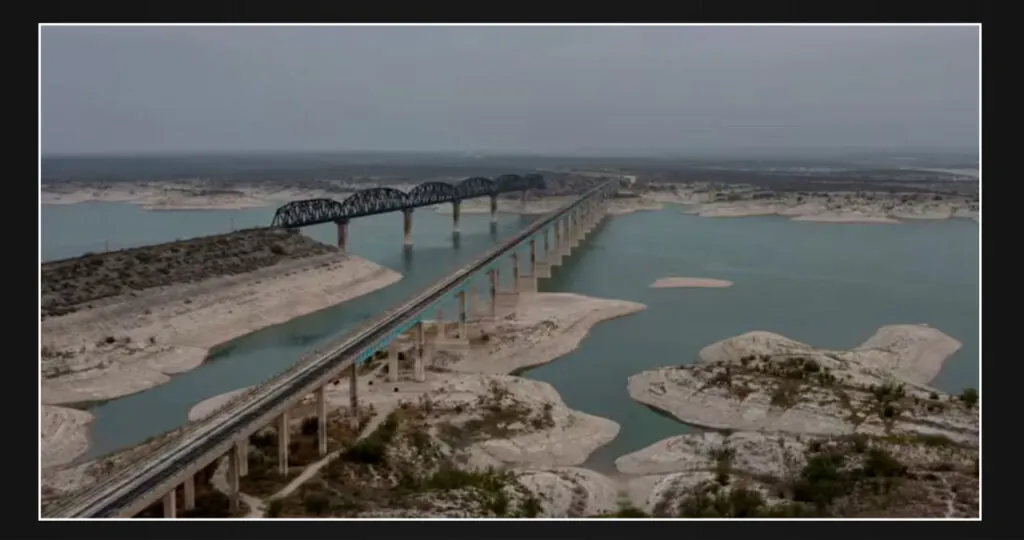South Texas is currently facing drought conditions, which have led to a rise in pressure on Mexico to fulfill its obligation of delivering water to the U.S. as per the 1944 treaty. However, an analysis conducted by the agency responsible for enforcing the treaty has revealed that the water from U.S. sources has considerably reduced over the years.
According to research set to be made public this week by the International Boundary and Water Commission, the federal agency responsible for managing the treaty with Mexico, the Rio Grande’s two international reservoirs are receiving less water compared to the 1980s, even without considering water deliveries owed by Mexico.
According to research conducted by the IBWC, the total inflow into the Amistad International Reservoir in the decade spanning from 2011 to 2020 was 33% less than the previous decade from 1981 to 1990. This accounts for a significant decrease of 4.6 million acre-feet overall. Similarly, the Falcon International Reservoir saw a 21.5% decrease in inflow compared to the 1980s.
According to Maria Elena Giner, a Commissioner of IBWC, the decrease in water availability emphasizes the importance of diversifying the region’s water supply. She pointed out that currently, 90% of the water supply in the area is dependent on the Rio Grande.
Giner emphasized that it is crucial to address the issue of building drought resiliency in the region. “They really need to take a closer look at this,” he said.
With the water levels at the reservoirs remaining low, many local water supply corporations are exploring alternative sources of water. The Amistad reservoir is currently at a mere 19% of its capacity, while the Falcon reservoir is at a concerning 12% of its capacity.
State Rep. Janie Lopez, a Republican from San Benito, emphasized the need for the Texas Legislature to concentrate on revolutionary and practical approaches to expand the water resources in the Rio Grande Valley and across the state. She believes that the state must seek out innovative solutions to diversify its water supply.
According to Lopez, the Texas Water Fund was established by lawmakers in the previous legislative session, providing a whopping $1 billion resource to assist cities in upgrading their water systems and funding conservation projects. Recently, the Texas Water Development Board outlined the distribution plan for these funds.
Giner, the commissioner of IBWC, emphasized that despite the analysis concentrating on the water loss from the U.S. tributaries, their top priority is to ensure Mexico’s compliance with the 1944 treaty.
As per the treaty, Mexico is obligated to provide the U.S. with 1,750,000 acre-feet of water every five years from six tributaries in Mexico. This amounts to an average of 350,000 acre-feet per year. In return, the U.S. is responsible for providing water from the Colorado River to Mexico.
Mexico is currently lagging behind on its deliveries by approximately 900,000 acre-feet in the ongoing five-year cycle, which is slated to end in October 2025.
Despite citing their own drought conditions as the reason for the shortage, Mexican officials have been facing pressure from U.S. officials to comply with proposed restrictions on federal aid.
According to U.S. Representative Vicente Gonzalez, a Democrat from McAllen, the research conducted by the IBWC confirms what the residents, farmers, and ranchers in the area have been aware of for quite some time. The region is currently experiencing a severe water crisis that has been further aggravated by Mexico’s water debt.
According to a statement by Gonzalez, the findings should be utilized to improve the water infrastructure and ensure prompt water deliveries from Mexico.
The Mexican officials are in talks with the IBWC regarding a proposed amendment, also known as a “minute,” to the 1944 treaty. The amendment aims to establish work groups that will facilitate the construction of new sources of water and encourage Mexico to release water from its reservoirs instead of waiting for the water to spill over floodgates during the rainy season. Additionally, the amendment would incentivize Mexico to deliver water on an annual basis, ensuring a steady supply of water. The talks between the IBWC and Mexican officials are ongoing, and the proposed amendment is expected to have a positive impact on water management in the region.
The Methodist Healthcare Ministries of South Texas, Inc. is providing partial support for reporting in the Rio Grande Valley.
Get ready for an unforgettable experience as the complete program for the 2024 Texas Tribune Festival is now available. From September 5-7, downtown Austin will be filled with over 100 engaging conversations covering various topics such as education, the economy, Texas and national politics, criminal justice, the border, the 2024 elections, and many more. Don’t miss out on this opportunity and check out the full program to plan your schedule.
Read More:
- Heavy Thunderstorm Watch for Pennsylvania and Ohio until 8 p.m
- Over 150,000 names removed from voter rolls in Ohio’s maintenance process
